IDEA Learners program brings teachers and researchers together to develop impactful curriculum
Rebecca Fry, PhD, UNC Superfund Research Program (SRP) director, sparked the curiosity of a group of high school science teachers when she introduced systems biology during a professional development institute in summer 2022. Her presentation, alongside others by additional SRP researchers, helped participating teachers think about how to integrate real world data into their instruction.
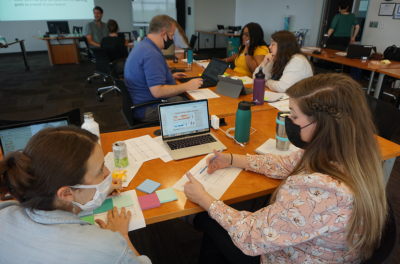
IDEA Learners participants during a design institute
Iterative Design to Engage All (IDEA) Learners is a teacher professional development program grounded in design thinking, which engages secondary science teachers and researchers in co-developing curriculum for high school science classes. Per- and polyfluoroalkyl substances (or PFAS), also known as harmful “forever chemicals,” are man-made and abundant in the environment due to their persistent nature, and have made their way into our bodies, even before birth. Given their relevance to all of us, these chemicals are the focus of curriculum development.
Members of the UNC SRP and the UNC Center for Environmental Health and Susceptibility (CEHS) launched the program in 2022 after receiving a Science Education Partnership Award (SEPA) from the National Institutes of Health’s National Institute of General Medical Sciences. One goal of IDEA Learners is to develop curriculum on a timely and relevant environmental health topic to engage students across a classroom, including those who identify as members of groups that are underrepresented in the STEM workforce. This project is led by Kathleen Gray, PhD, Research Associate Professor in the UNC Institute for the Environment (IE), and Dana Haine, MS, K-12 Science Education Manager in UNC IE.
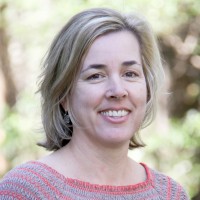
Dana Haine
“This program is unique because it supports teachers in the design of activities that showcase the process by which scientists are studying environmental disease outcomes for an emerging class of contaminants, like PFAS,” says Haine. “We can engage students in learning about a real-world issue while also promoting biomedical research careers, particularly in the field of toxicology.”
During two, multi-day design institutes, eight high school science teachers interacted with a team of SRP researchers from UNC and NC State University and program staff from CEHS and the UNC School of Education to use design thinking to co-develop standards-aligned curricula. The resulting lessons introduce students to this emerging class of chemicals and to the research taking place to study the health effects associated with exposure.

Dr. Kathleen Gray
“Another exciting aspect of this program was the application of design thinking to curriculum development,” said Gray. “Our collaborators in the UNC School of Education led teachers through a series of exercises and conversations designed to foster empathy for their students. That, in turn, helped teachers think about how to make complicated science more engaging.”
The process of co-designing lessons with input from science teachers and SRP researchers, ensures that the curriculum is practical and accurate, yet relevant to students.
Andromeda Crowell, MS, and Clare Matusevich, MS, are two of the teachers who participated in the IDEA Learners design institutes and are piloting the newly designed curriculum with their students in spring 2023.
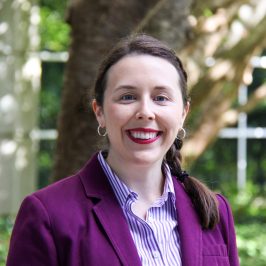
Andromeda Crowell
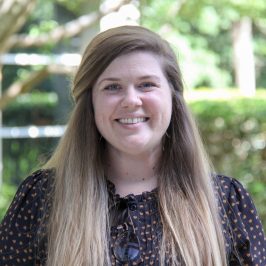
Clare Matusevich
Both Crowell and Matusevich feel as though this program has elevated their level of instruction and allowed them to feel more comfortable in teaching complex research topics to students.
“After participating in the design institutes, I am much more prepared to scaffold instruction to support students in analyzing and drawing conclusions from complex data sets,” explains Crowell.
Both teachers also expressed how valuable they find this program to be, for their own professional development, and also for promoting student learning.
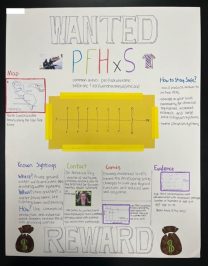
PFAS Wanted Poster, Matusevich’s class. Includes research from the Fry lab.
“The opportunity to hear directly from scientists was eye-opening and so interesting. The researchers were clearly passionate about not only their research, but also sharing their research with others,” explained Matusevich. Two researchers affiliated with the NCSU SRP—Jamie Dewitt, PhD, of East Carolina University and Scott Belcher, PhD, of NCSU—also joined the program, as did a number of SRP trainees.
“Students have an opportunity to authentically practice their data literacy skills rather than being given a ‘cookie cutter’ data set that is more straightforward to interpret,” continued Crowell. “They get to act as scientists and feel excited that they are on the cutting edge of current research on this topic, because they are!”
Matusevich explained that her students have become incredibly invested in the topic of PFAS. “Many students now mention PFAS research and news about PFAS that they come across on their own, and we weave it into our daily class discussions,” she says.
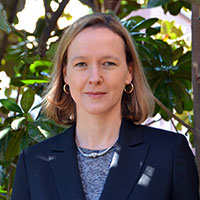
Dr. Rebecca Fry
Some of the SRP research data that teachers selected to incorporate into the IDEA Learners curriculum are from Fry’s lab. Fry understands the importance of this collaboration to educate students on a relevant scientific issue and showcase the diversity of researchers and scientific disciplines represented among people studying PFAS.
“It was an honor to work with teachers from across the state to share with them what we are doing in the lab related to PFAS and women and children’s health. The fact that they are incorporating the critical issue of PFAS exposure into high school lessons is so inspiring, and so necessary to teach the next generation about the long-lasting health impacts of exposure,” says Fry.
